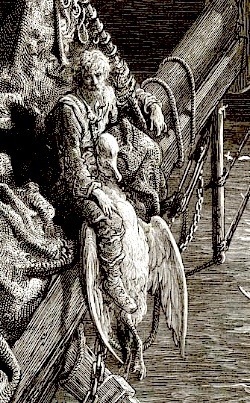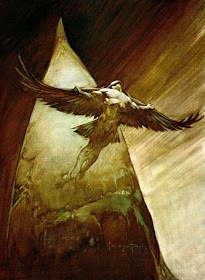The title quote comes from Samuel Taylor Coleridge’s classic poem The Rime of the Ancient Mariner. And, for those of you not familiar with the poem, these words are how the Ancient Mariner describes his killing of an albatross.
Now, I don’t profess to be an expert about this poem, not even for a minute. In fact, like with a lot of poetry, I tend to let the words simply wash over me and then form an impression of the poem based on what stays with me after I have finished reading.
Granted, it’s probably a fairly imprecise way of dealing with poems, but I am far more interested in poetic appreciation these days rather than deep contextual analysis and interpretation. Suffice to say, I’m content to leave such tasks to academics and their PhD students.
So, with that understood, I wish to now talk about what the title quote means to me, personally. Because I admit to currently being obsessed by the idea of having done “an hellish thing”, for which one must next do penance.
I can’t explain directly why this concept should fascinate me as much as it does. I mean, it’s not like, for instance, that I’ve done anything particularly hellish myself ever. Well, not in this lifetime, I’m pretty certain.
However, as a case in point about my obsession, when it came to my writing a novel, I chose for some undefinable reason to write about the defunct Antichrist’s search for a personal moral compass and eventual redemption, in a world long gone to hell. And, surely, there exists no more hellish figure than that, obviously other than Satan himself.
So, do I identify with this figure, then, somehow? This most evil and unforgivable agent of the apocalypse? Is that what is going on here? For why else would I have spent all those hours writing a novel about such an odious character?
And, I suppose, therefore, the answer to these questions must ultimately be, “yes”. Essentially, I see something universal about the figure of the Antichrist. There is something of the Antichrist in each and everyone of us, I would suggest. But let me explain, first, before you object.
OK, for me, then, this is the meaning behind the Rolling Stones’ lyrics to Sympathy for the Devil, where Mick Jagger sings,
‘I shouted out,
“Who killed the Kennedys?”
When after all
It was you and me’
You see, we all carry the burden of guilt for hellish things that are done in the world, even when those things are done ostensibly by others. If there is evil in the world, it is the responsibility of each and every one of us to identify our own individual share in this evil.
Women and children are being killed every day in foreign war zones. And if you live in a Western democracy you must accept that a certain percentage of these innocent civilians are being killed in your name. I’m sorry to say it, but it’s true. Even if it’s happening on the other side of the world, in a country you can’t find on a map. It is a sickening fact you can’t truthfully deny.
Whether we like it or not, we all carry this guilt, just like the Ancient Mariner, who had the body of the albatross he killed tied around his neck, as penance.
And you know what? It stinks! Sure, some of it is simply middle-class guilt, I’m describing. A privileged form of despair, if you will. But, deep down, anyone with even a scrap of conscience must concede that our lives are ultimately built on the suffering and exploitation of others.
I understand it’s not a pleasant message I’m putting out there. But I honestly believe it to be the truth. Likewise, with the novel I wrote. It may not have the most pleasing literary style or even a heart-warming narrative, but it seeks to tell it like it really is. Not how we like to think things are, but how they are below the sanitized surface of political correctness.
But why? Why would I intentionally set out to remind people about what miserable wretches we all are? Why, indeed…
Well, anyway, let me tell you why. Because I have done an hellish thing, and this is my penance.







You must be logged in to post a comment.